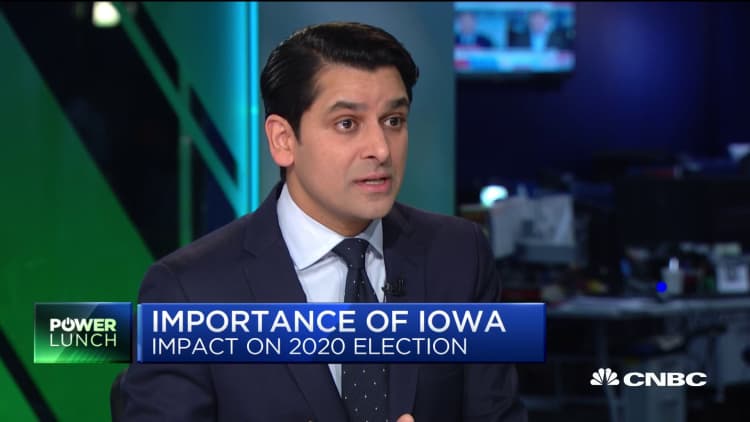Some of the best-known Silicon Valley investors and top names in Hollywood are behind the nonprofit group that launched the app that broke down during the Iowa caucus Monday night.
Results from the first-in-the-nation voting event for the 2020 election are still unknown after Iowa officials reported irregularities with the data from the app, forcing them to switch to manual counting. Iowa Democrats were using an app developed by Shadow, a progressive start-up managed by a three-year-old nonprofit called Acronym.
To raise capital, Acronym established a political action committee called Pacronym, which the organization's web site says helped elect 65 "progressive candidates across the country" in 2018, a year before it invested in Shadow. Pacronym has raised $7.8 million since the beginning of 2019, according to data from the Federal Election Commission.
That funding is going toward "advancing progressive causes through innovative communications, advertising and organizing programs," Acronym says on its site. In addition to Shadow, Acronym is an investor in a digital news organization called Courier Newsroom and digital strategy firm Lockwood Strategy.
Fourteen investors have each contributed at least $100,000 to Pacronym, all between October and December. From Silicon Valley, backers include Kenneth Duda, the chief technology officer of Arista Networks; Mike Moritz, the Sequoia Capital partner who made a fortune backing Google and Yahoo; Jim Swartz, the co-founder of venture firm Accel; and Mimi Haas, who's not in tech but is a major Bay Area figure and the widow of Peter Haas of the Levi Strauss family.
The entertainment industry's ties to Acronym are even more notable. Director Steven Spielberg contributed $500,000 to Pacronym as did his wife, the actress Kate Capshaw. Producer Jeffrey Katzenberg and Katie McGrath, co-CEO of J.J. Abrams' Bad Robot Productions, each put in $100,000.
Pacronym's other million-dollar backers are hedge fund managers Seth Klarman and Donald Sussman, with big checks also coming from philanthropist Geoffrey Gund and John Fisher of the family that started Gap.
Pacronym's website features a campaign called "Four is Enough," which is raising money to try and help defeat President Donald Trump's bid for a second term, focusing on "swing voters in key 2020 battleground states."
"Through innovative advertising campaigns on Facebook, Youtube, and other platforms, Four is Enough will reach voters online and on their mobile devices and explain what's at stake in the November elections," the site says.
Acronym is led by co-founder Tara McGowan, a former journalist who also previously served as digital producer for Barack Obama's 2012 re-election campaign. The group has close to 50 employees, according to LinkedIn, including former employees from Facebook, Amazon, Pandora and political campaigns.
In a statement, Acronym acknowledged that it's an investor in Shadow, but said that the nonprofit itself has not provided any technology to Iowa Democrats or any other political groups.
"We are reading confirmed reports of Shadow's work with the Iowa Democratic Party on Twitter, and we, like everyone else, are eagerly awaiting more information from the Iowa Democratic party with respect to what happened," a spokesperson wrote.



